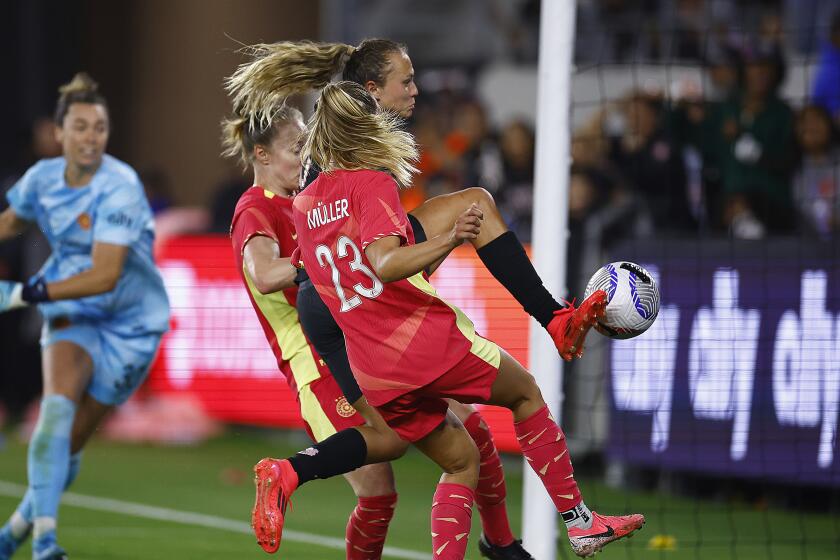Off-Season Starts Early for Some
What once seemed good from afar is now far from good.
From a distance -- as in, a few weeks ago -- the final weekend of the NFL season held spectacular promise. Maybe even historic promise.
The then-undefeated Indianapolis Colts might be polishing off a perfect regular season against Arizona. Chicago’s game at Minnesota might be for the NFC North title. And two other games, Denver at San Diego and Cincinnati at Kansas City, looked like can’t-miss classics.
Now, the Colts are coming off consecutive losses, the Vikings and Chargers are out of the playoff race and the Chiefs are dangling by a thread. Mostly, the intrigue is over.
For the teams that are four quarters from the off-season, the challenge is to find some meaning in their finale, and avoid at all costs giving the impression they’re coasting across the finish line. Because there’s one four-letter word that even the most grizzled football coaches refuse to utter: quit.
Still, with the way the NFL draft system is devised, there’s incentive for the worst teams to keep losing. It’s possible that Houston, Green Bay, San Francisco, New Orleans and the New York Jets could each finish 3-13, meaning there would be a five-way tie in the Reggie Bush derby.
Whereas playoff tiebreakers are determined by head-to-head play, or conference and divisional records, a draft tiebreaker would be based on a team’s strength of schedule after the regular season has finished.
If the Texans (2-13) win at San Francisco (3-12) on Sunday, and the other three 3-12 teams lose, the Saints likely would have the inside track on landing the star USC running back.
Even so, the mere suggestion that a team has packed it in for the season can send a coach into convulsions of anger -- and can possibly send him packing.
Three years ago, after the Jets started 1-5, a reporter asked Coach Herman Edwards if he was concerned about his players quitting on him. Edwards erupted with an impassioned rant played over and over on national television. In it, Edwards said: “You play to win the game,” emphasizing every word. It not only became his signature saying but the title of his autobiography.
The shadowy suggestion of quitting can cloud the brightest of careers. Eleven years ago, the Jets fired Pete Carroll after one season. The Jets finished 6-10 that season with a 24-10 loss to the Houston Oilers in which at least two Jet defenders appeared to essentially quit. Reclusive owner Leon Hess said as much in a rare postseason news conference when he introduced Rich Kotite as the new coach.
Then there were the Saints in 2001, who were coming off a 10-6 season when Jim Haslett was selected coach of the year. They won three of their first four games in 2001 before the wheels started to fall off. They wound up losing their last four games by a combined margin of 160-52. The Saints played like they had their bags already packed, or at least that’s what Terrell Owens said after his 49ers beat them, 38-0, in a regular-season finale.
An NFL personnel executive said it’s fairly easy to spot on film when someone takes a play off. Defensive linemen stand straight up and allow themselves to be blocked. Offensive linemen lean into guys rather than exploding into them. Defensive backs and linebackers stop pursuing as fiercely as they normally would. On running plays, receivers jog through routes rather than selling the decoys.
“You’ll see it this weekend,” the executive said. “A coach hates that because it’s a reflection on him. That’s why you always hear on a bad team, ‘My guys are playing hard.’ ”
A comment like that doesn’t seem self-serving, but in a way it is. The coach is essentially saying, “We might have a losing record, but at least I’m still doing my job.”
There’s also a significant downside for players who take their foot off the gas pedal. They can get a reputation for loafing, which severely drives down their value on the free-agent market. Also, players say, you’re much more susceptible to injury when you’re going at less than full speed.
That said, some players have found ways to make it look as if they’re working a lot harder than they actually are. It usually happens in training camp or, occasionally, in exhibitions. There’s even a name for it: brother-in-lawing.
To brother-in-law means to have an agreement with the guy across the line of scrimmage, an understanding that you’re both going to take the play off, pretending to play hard when you’re just going through the motions. When it happens, it usually takes place in practice or exhibitions, and often in the trenches.
Not surprisingly, former players are more willing than current ones to talk about brother-in-lawing.
“Sometimes it’s verbalized,” said Ed Cunningham, who spent six seasons with the Cardinals and Seahawks.
“You’ll be walking back to the huddle and say, ‘Listen, I’ll chill a little bit if you do.’ ”
Other times, hand signals do the trick.
“Offensive linemen know how to survive,” former NFL linebacker Eric Hill said. “In practice, they’ll look at you and pat their hands down, like, ‘I’m coming off a little soft.’ Then when you’re engaged, they tell you, ‘Yeah, I like that. Keep it just like that.’
“There’s a reason why guys last 15 years.”
Then again, there’s a reason some guys don’t.
“When you’re evaluating a guy, you don’t just look at important games, you look at all of his games,” the personnel executive said. “If a guy dogs it, even when it doesn’t count, you’re not going to like that.... Now with the way the [salary] cap is, if you’re going to dog it, you aren’t going to be around very long.”
*
BEGIN TEXT OF INFOBOX
Playoff possibilities
NFC
* Chicago (North) and Seattle (West) have clinched division titles and first-round byes, with Seattle having home-field advantage throughout the playoffs.
* The New York Giants have clinched a postseason berth, and can go to the playoffs as East Division champions with a victory or a tie Saturday at Oakland. Washington can clinch a berth with a victory at Philadelphia on Sunday or a Dallas loss, and would advance as East Division champion if New York loses.
* Dallas can clinch a playoff spot with a win and a Washington loss or tie, or with a win and a Carolina loss, or with a win, a Tampa Bay loss and a N.Y. Giant loss.
* Tampa Bay can clinch the South Division with a victory Sunday over New Orleans or with a Carolina loss. Carolina can advance to the playoffs if it wins Sunday at Atlanta, as a wild-card team, or -- if Tampa Bay loses -- as South Division champion.
AFC
* Cincinnati (North), Indianapolis (South), New England (East) and Denver (West) have clinched division titles, with Indianapolis having home-field advantage throughout the playoffs and Denver getting the other first-round bye.
* Jacksonville has clinched a wild-card berth.
* Pittsburgh can clinch a wild-card berth with a victory Sunday over Detroit or a Kansas City loss to Cincinnati or a San Diego victory over Denver. Kansas City needs a victory Sunday over Cincinnati, a San Diego loss or tie and a Pittsburgh loss to qualify.
More to Read
Go beyond the scoreboard
Get the latest on L.A.'s teams in the daily Sports Report newsletter.
You may occasionally receive promotional content from the Los Angeles Times.











